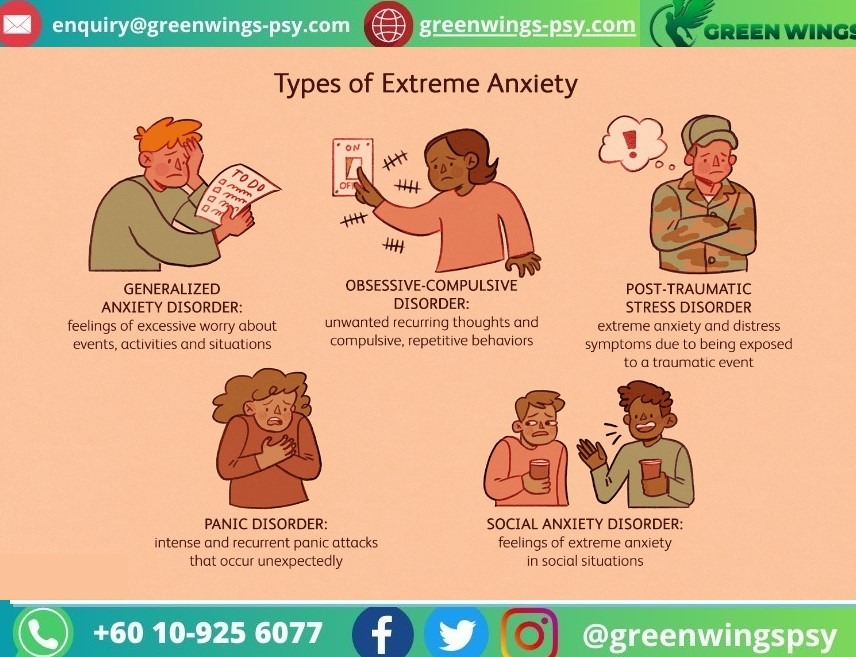Introduction:
In the intricate landscape of mental health, anxiety disorders stand as formidable challenges, affecting millions of individuals globally. The impact of anxiety disorders reverberates across various facets of life, casting shadows on personal well-being, relationships, and daily functioning. Amidst this struggle, counseling emerges as a beacon of hope, offering a path towards understanding, healing, and reclaiming a life free from the clutches of anxiety.
Understanding the Impact of Anxiety Disorders:
Anxiety disorders manifest in diverse forms, ranging from Generalized Anxiety Disorder (GAD) to specific phobias, panic disorders, and social anxiety. Regardless of the specific diagnosis, the common thread is an overwhelming sense of fear, worry, and unease that significantly impairs daily functioning.
The psychological impact of anxiety disorders is profound. Individuals often find themselves trapped in a cycle of anxious thoughts, unable to break free from the incessant worry about potential threats, both real and perceived. This mental turmoil can lead to difficulties concentrating, making decisions, and maintaining emotional balance.
The physical toll of anxiety should not be overlooked. Chronic anxiety can manifest in physical symptoms such as headaches, muscle tension, fatigue, and digestive issues. Moreover, the persistent release of stress hormones during anxious episodes can contribute to cardiovascular problems and weakened immunity.
The Role of Counseling in Addressing Anxiety Disorders:
Counseling, particularly in the form of psychotherapy, plays a pivotal role in addressing and alleviating the impact of anxiety disorders. Here are several ways in which counseling serves as a catalyst for positive change:
Identification and Understanding:
Counseling provides a safe space for individuals to explore and understand the root causes of their anxiety. By delving into past experiences, thought patterns, and triggers, individuals gain insight into the factors contributing to their anxiety. This self-awareness is a crucial first step toward effective management and recovery.
Skill Development:
Therapists employ various therapeutic techniques to equip individuals with coping skills and strategies to manage anxiety. Cognitive-behavioral therapy (CBT), for instance, helps individuals identify and challenge negative thought patterns, replacing them with healthier alternatives. These skills empower individuals to navigate challenging situations with resilience and composure.
Emotional Support:
The therapeutic alliance formed between a counselor and their client offers a unique and invaluable source of emotional support. In a non-judgmental and empathetic environment, individuals feel heard and validated. This support is instrumental in breaking the isolation often experienced by those with anxiety disorders, fostering a sense of connection and understanding.
Behavioral Interventions:
Counselors may utilize behavioral interventions to gradually expose individuals to feared situations in a controlled and supportive manner. This exposure therapy helps desensitize individuals to anxiety triggers, enabling them to confront and overcome their fears.
Relapse Prevention:
Counseling helps individuals develop relapse prevention strategies to maintain progress and prevent setbacks. By recognizing early warning signs and implementing coping mechanisms, individuals are better equipped to navigate challenges and sustain the gains achieved in therapy.
Mediation and Mindfulness:
Mindfulness-based interventions, often integrated into counseling, promote a present-focused awareness that can be particularly beneficial for managing anxiety. Techniques such as meditation and deep breathing exercises foster a sense of calm and centeredness, providing individuals with tools to ground themselves in moments of heightened anxiety.
Conclusion:
The impact of anxiety disorders on mental health is undeniable, but counseling emerges as a powerful ally in the journey toward recovery. By addressing the psychological, emotional, and behavioral aspects of anxiety, counseling offers a comprehensive approach to healing.
It is essential to recognize that seeking counseling is not a sign of weakness but a courageous step toward reclaiming one’s life. As awareness grows and destigmatization efforts continue, more individuals may find the support they need to break free from the shackles of anxiety. In the realm of mental health, counseling stands as a beacon, illuminating the path toward understanding, healing, and ultimately, restoring a sense of balance and well-being for those grappling with anxiety disorders. We at Green Wings Recovery Centre are determined to provide one of the best and more effective treatment for bipolar disorder along with all kinds of major addiction treatment such as drug addiction, alcohol addiction, gambling addiction etc under one roof through our most effective addiction and mental health treatment programs under the supervision of most experienced addiction specialist and mental health professionals. To know more about our treatment structure and fees; do feel free to reach us via Call/Whatsapp +60 10-925 6077 or visit our website https://greenwings-psy.com/.

